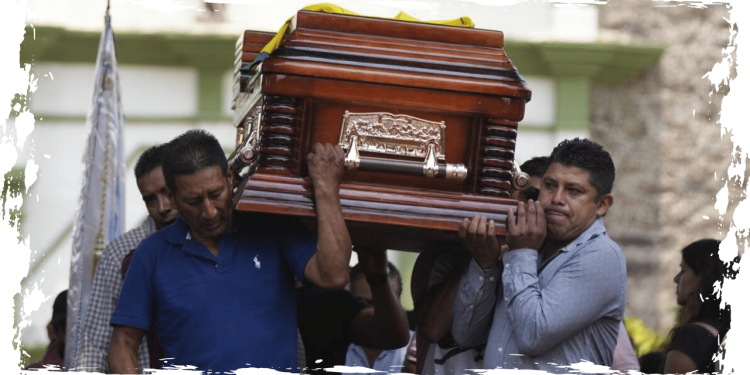Mexico’s drug cartels and gangs seem to be exerting a greater influence in the upcoming elections, which will determine the presidency, nine governorships, and approximately 19,000 mayorships and other local positions.
In the lead-up to Sunday’s election, there has been a disturbing rise in the use of violence by gangs. They have resorted to tactics such as firing gunshots at campaign rallies, destroying ballot papers, obstructing the establishment of polling stations, and even displaying banners to sway voters.
According to security analyst David Saucedo, there is a high probability that certain drug gangs will attempt to coerce voters into voting for their preferred candidates.
According to Saucedo, it is a reasonable assumption that the cartels will activate their support networks during the upcoming elections. These networks consist of loyal voters who have been won over through the provision of various incentives such as food packages, cash, medicine, and infrastructure projects. The cartels are expected to leverage these networks to back candidates with ties to the drug trade.
In certain regions, it seems that gangs are actively promoting voter participation while simultaneously discouraging voting in areas under the control of their rivals.
Gunmen, believed to be connected to a cartel, took the lives of 11 individuals in Chicomuselo on May 14. Furthermore, on May 17, a mayoral candidate and five others tragically lost their lives when gunmen targeted a crowd in La Concordia, Chiapas, which is situated approximately 45 miles (75 kilometers) east of Chicomuselo.
Mass attacks on campaign rallies, which were once exceedingly rare in Mexico, are now becoming increasingly common. These attacks have resulted in the deaths of numerous supporters, far outnumbering the candidates themselves. The impact of these attacks is undeniably intimidating.
On Wednesday, as the last official day of campaigning drew to a close, an unsettling incident unfolded just a few blocks away from the venue of a mayoral candidate’s final campaign rally in the western state of Michoacan. Unidentified gunmen unleashed a barrage of gunfire, causing panic among the hundreds of attendees who were forced to seek immediate shelter.
“It felt like any other typical evening, resembling the campaign endings of other candidates,” recalled Angélica Chávez, a homemaker who attended the rally in Cotija. “Suddenly, the air was filled with gunshots, multiple rounds of gunfire ringing out dangerously close. In an instant, chaos ensued as people scattered, desperately diving to the ground and crouching for safety.”
Chávez sustained injuries during the stampede and sought shelter in a nearby church.
In April, a tragic incident unfolded in Celaya, a city in Guanajuato, when armed individuals unleashed a hail of bullets at a campaign event. Regrettably, this senseless act claimed the life of a courageous mayoral candidate and left three of her loyal supporters injured.
According to Saucedo, the analyst, the recent shootings indicate that narco gangs are no longer willing to accept the defeat of their chosen candidates.
According to Saucedo, certain groups of drug traffickers resort to employing this tactic in order to prevent a candidate who doesn’t align with their criminal interests from winning, or to prevent a candidate associated with a rival drug gang from emerging victorious. Saucedo describes this strategy as a desperate move executed by these groups during the final stages of the election.
According to Saucedo, the phenomenon of narco-control in local politics has been observed in violent states like Tamaulipas. However, he notes that this influence is no longer confined to specific regions but is now spreading throughout the entire country.
The National Electoral Institute has been forced to cancel its plans for 170 polling places, primarily in Chiapas and Michoacan, due to security issues. In Chiapas, electoral authorities are unable to access certain locations. Although this accounts for a small percentage of the country’s 170,858 polling places, it is still concerning.
In Nuevo Laredo, a city on the northern border, a mysterious group, reportedly affiliated with the powerful Northeast drug cartel, has displayed posters alleging that a mayoral candidate is connected to the rival Gulf drug cartel.
The crude poster, featuring a photoshopped image of the candidate waving an assault rifle and donning a bulletproof vest adorned with the Gulf cartel’s insignia, awaits confirmation of its origin by the authorities.
Residents in Morelos, a state located just south of Mexico City, were startled this week when they discovered a banner hanging over a road. The banner alleged that a candidate running for governor had ties to competing drug cartels. Surprisingly, the anonymous signatory of the banner was none other than the notorious local drug lord known as “the Commander of the Three Letters.”
A different banner, believed to be connected to a gang, issued a warning to anyone attempting to purchase votes, stating that they would face severe consequences. The banner was signed by individuals who have a long-standing influence in the area.
It seems that recent events suggest that the cartels’ previous strategy of eliminating the most formidable candidate they dislike, resulting in the remaining major-party candidate winning by default, has become more intricate.










